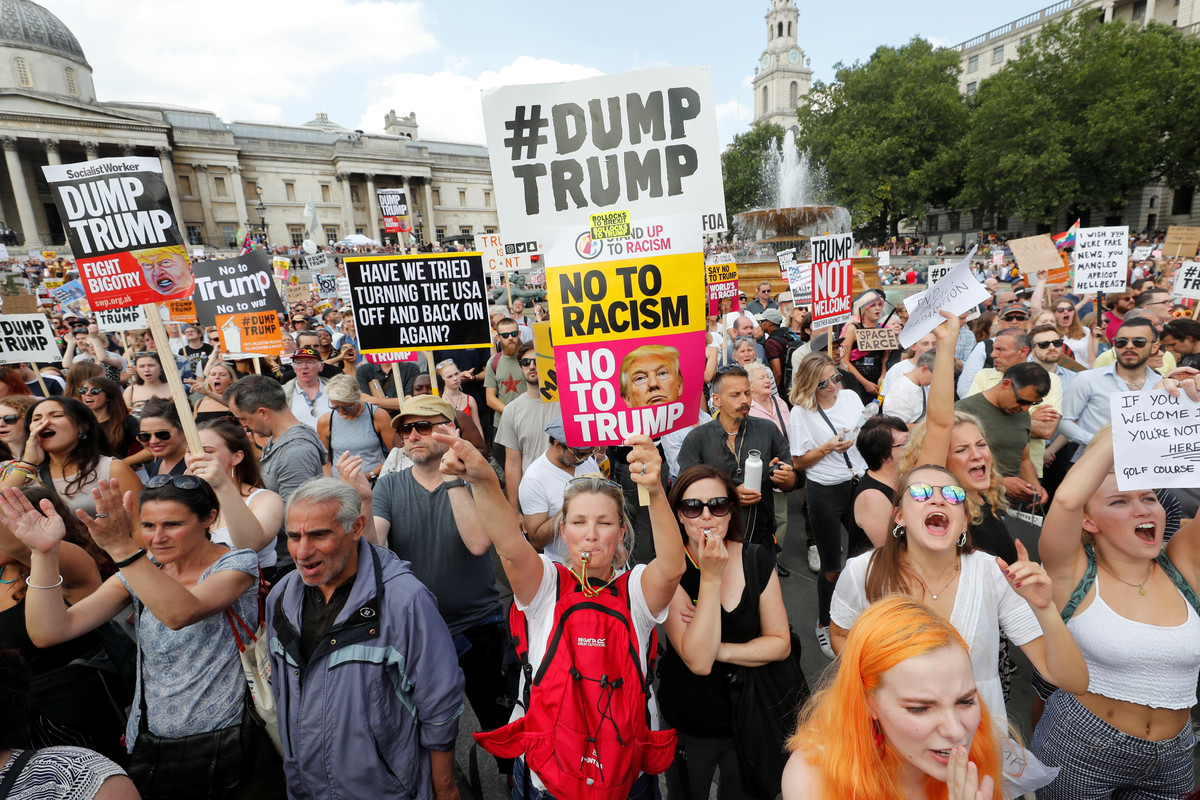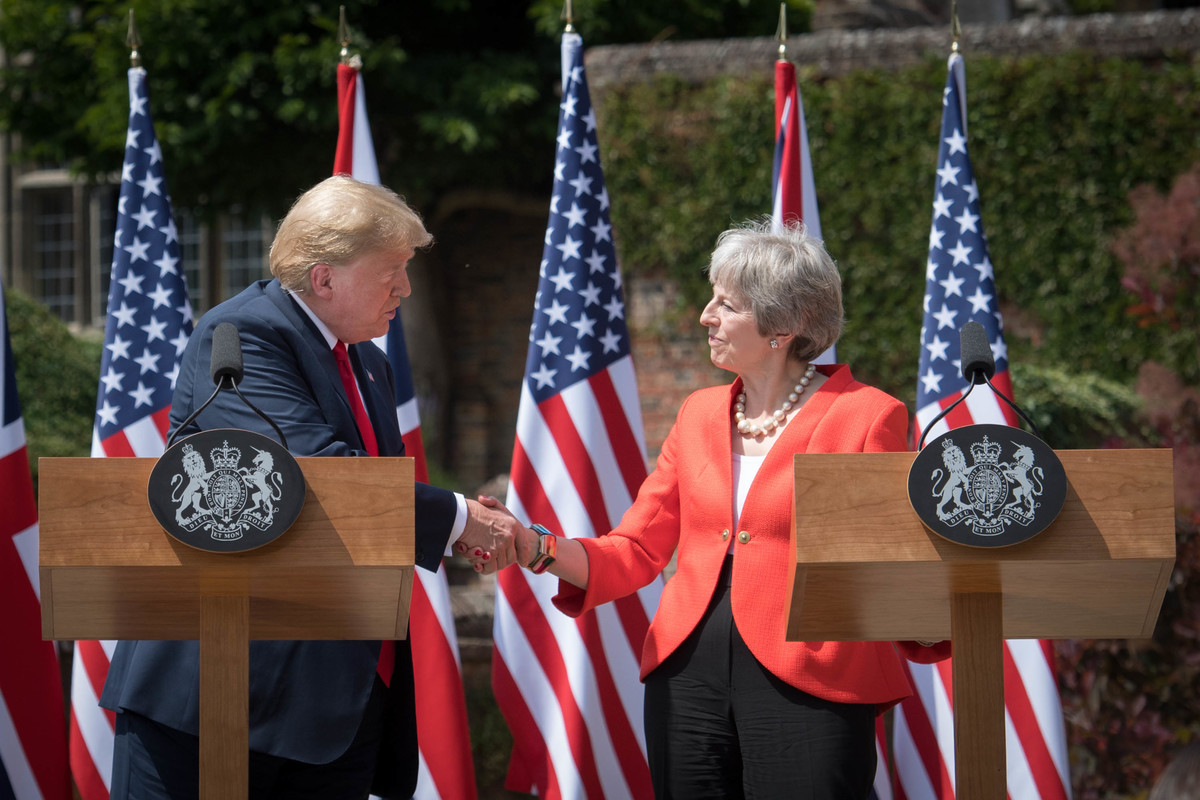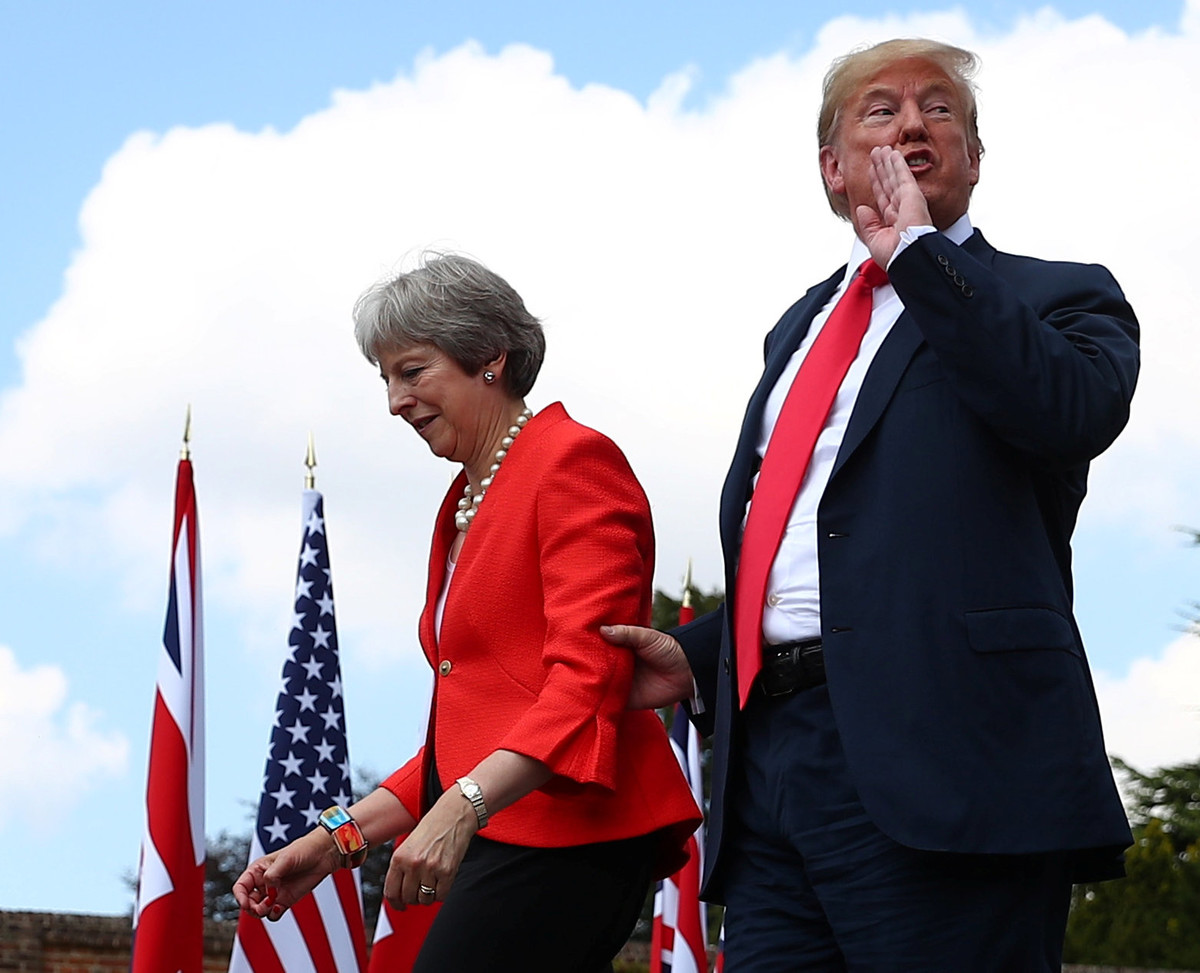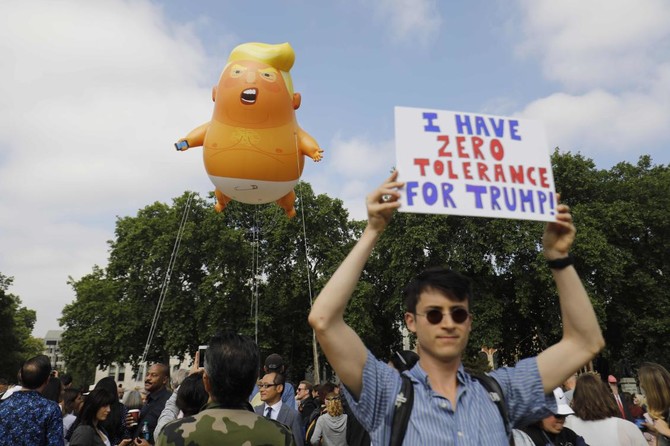LONDON: US President Donald Trump met Britain's Queen Elizabeth at Windsor Castle on Friday.
While Trump's trip was not the full state visit he was originally promised, he was heralded by military bands on his arrival at Windsor, before he and First Lady Melania had tea with the 92-year-old queen.
As Elizabeth waited for Trump's arrival, she glanced at her watch. At one point, Trump halted abruptly and the British queen had to walk around the US president while they were inspecting the guard.
He is due to fly to Scotland later on Friday for a private trip, before heading to Helsinki for a summit with Russian President Vladimir Putin.
Earlier on in the day, US President Donald Trump arrived at British Prime Minister Theresa May's Chequers country residence for talks followed by a news conference.
At the 16th century country house, May and Trump had lunch and then spoke to reporters on the second day of Trump’s visit to the UK.
Tens of thousands of protesters demonstrated in London on Friday against US President Donald Trump, whose four-day visit to Britain has been marred by his extraordinary attack on Prime Minister Theresa May's Brexit strategy.
"#DumpTrump", "This is the carnival of resistance" and "My mum doesn't like you! And she likes everyone" read some of the signs held up by protesters as they marched down Oxford Street towards Trafalgar Square.
"No Trump, no KKK, no fascist USA!", the protesters chanted.

Demonstrators, from a number of different groups, take part in an anti-Trump protest in central London, Britain, July 13, 2018. (Reuters)
Some protesters banged on pots and pans, others blew on trumpets and many held up orange "Stop Trump" balloons.
Grant White, 32, carried a sign depicting Trump as the Twitter bird symbol wearing a swastika around his arm.
"I am anti-Brexit, anti-Trump. There is a wave of fascism which we have to get rid of," he said.
Dawn, 49, came with her 11-year-old daughter Sadie.
"Trump is the man with the biggest ego in charge of the biggest power in the world. He doesn't have a grasp of what is needed in the world," the mother said.
Her daughter said: "He doesn't accept people who have a different religion in his country, where there is big diversity."
Campaigners elsewhere in London flew a "Baby Trump" balloon, an act of protest approved by London mayor Sadiq Khan which has proved particularly contentious for Trump and his supporters.
The number of protestors could have been swelled by Trump's interview to The Sun newspaper which emerged after British Prime Minister Theresa May hosted him at an opulent black-tie dinner on Thursday in the leafy splendor of Blenheim Palace.

A giant balloon inflated by activists depicting US President Donald Trump as an orange baby is seen during a demonstration against Trump's visit to the UK in Parliament Square in London on July 13, 2018. (AFP)
In the interview in The Sun tabloid published Friday, Trump said May's plans to keep close economic ties with the EU after Brexit would "kill" its hopes of a US trade deal.
He also warned about migration into European cities including London, criticising Mayor Sadiq Khan over recent terror attacks and knife crime.
He also suggested Boris Johnson, who quit as foreign secretary this week in protest at May's Brexit proposal, would make a good prime minister.
"@realDonaldTrump determined to insult our PM," said Sarah Woollaston, a Conservative MP and chairwoman of parliament's health committee.
However, British Prime Minister Theresa May’s spokeswoman said Friday that she has a good relationship with Donald Trump and is confident a trade deal can be agreed with the United States after the president criticised her Brexit plans in an interview.
"Trade is one of the top items for discussions between the president and the PM today and ... we are confident that we can do a good trade deal with the US," the spokeswoman told reporters.
"The prime minister has a good relationship with the president.”
Sitting alongside May at the beginning of talks at the prime minister's country retreat of Chequers, Trump said Friday his relationship with Prime Minister Theresa May was "very, very strong" after his earlier attack on her Brexit strategy.
He said: "The relationship is very, very strong. We really have a very good relationship."
Trump spoke at a news conference with May following meetings at her official country estate outside of London. During the conference, he said that the interview with The Sun was fake news and that he did not criticize May.

US President Donald Trump (L) and Britain's Prime Minister Theresa May (R) shake hands during a press conference following their meeting at Chequers.(AFP)
Theresa May is an "incredible woman" who is "doing a fantastic job" as the British prime minister.
Trump commented as he sought to soften the blow after he criticized aspects of her leadership in the interview published by The Sun.
The US president also said that he discussed a range of priorities including nuclear non-proliferation with May during their meetings. He said that it was the “biggest problem in the world.”
"We discussed a range of priorities including stopping nuclear proliferation. I thanked (May) for her partnership in our pursuit of a nuclear-free North Korea. We both agreed that Iran must never possess a nuclear weapon."
He added that he encouraged May to “sustain pressure on Iran.”
Contrary to the comments he made in his interview with The Sun regarding Brexit, President Trump also said that however the UK leaves the EU “is ok with me.”
Trump added that “Brexit is a very tough situation...between the borders and the entries into the countries and all of the things."
"The only thing I ask is that she (May) work it out so that we can have very even trade because we do not have a fair deal with the EU right now on trade. They treat the US horribly and that's going to change."
"If it doesn't change, they're going to have to pay a very big price."

Britain's Prime Minister Theresa May and U.S. President Donald Trump walk away after holding a joint news conference at Chequers. (Reuters)
Asked to rate US-UK relations, Trump gave them the "highest level of special."
President Trump also said that he will bring up the issue of Syria at his meeting with Putin in Helsinki on Monday.
(With agencies)
































